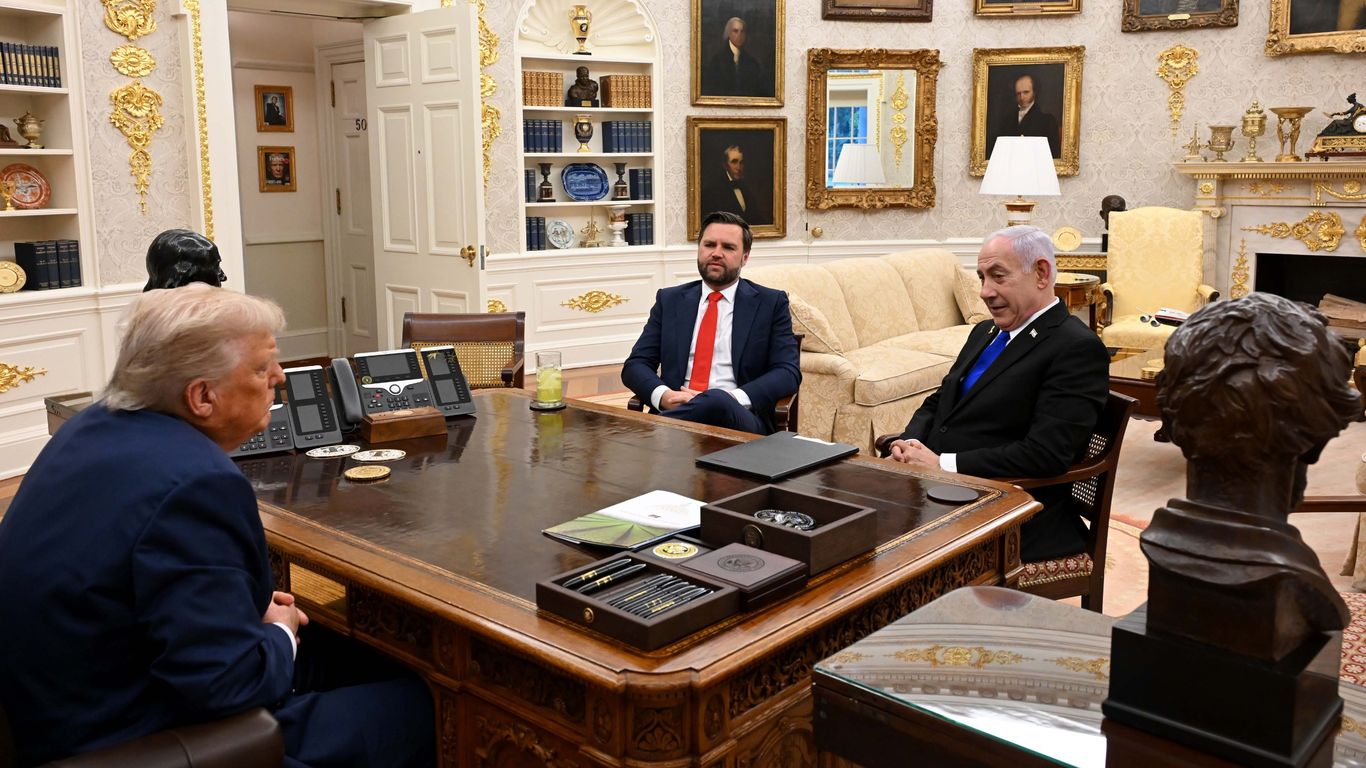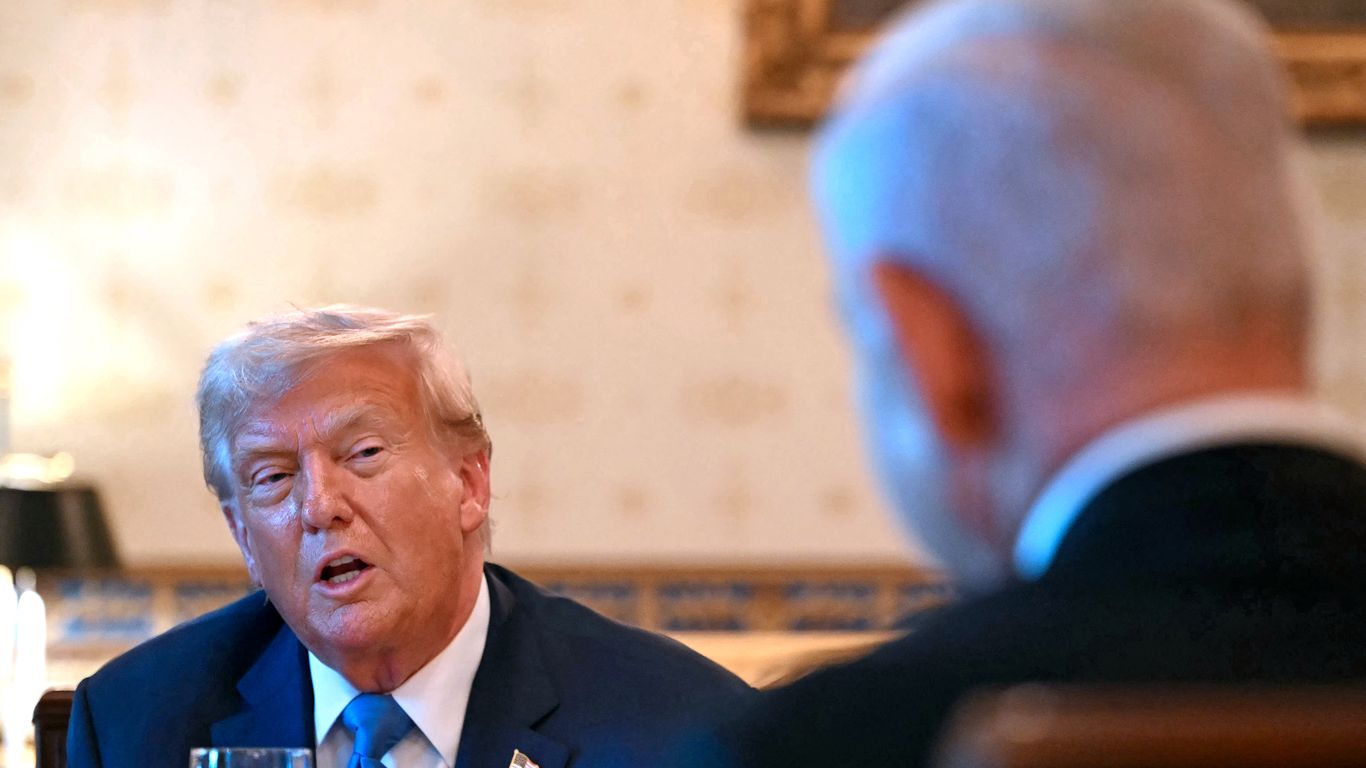Controversial Plan to Fully Occupy Gaza Approved by Israeli Security Cabinet and US Government

Introduction
In a controversial move, the Israeli Security Cabinet is expected to approve a plan to fully occupy Gaza, with the support of the US government. This decision has been met with strong opposition from the international community and human rights organizations. However, despite previous opposition, President Trump has reportedly given his approval to the plan, according to US officials.
The Plan's Details
The plan, proposed by Israeli Prime Minister Benjamin Netanyahu, would involve the complete annexation of Gaza, with Israeli forces taking control of the territory. This would effectively eliminate any possibility of a Palestinian state and would greatly impact the lives of the 2 million Palestinians living in Gaza. The plan also includes the construction of a new settlement in the West Bank, which has been met with criticism from the United Nations and other world leaders.
The Impact
If approved, this plan would have far-reaching consequences for the people of Gaza and the region as a whole. It would further escalate tensions between Israel and Palestine, and could potentially lead to an increase in violence and human rights abuses. This decision also goes against the long-standing US policy of supporting a two-state solution, and could strain relationships between the US and other countries. It remains to be seen how this move will unfold and what impact it will have on the already volatile situation in the Middle East.
About the People Mentioned
Benjamin Netanyahu
Benjamin Netanyahu, born on October 21, 1949, in Tel Aviv, Israel, is a prominent Israeli politician and diplomat who has served as Prime Minister of Israel three times (1996–1999, 2009–2021, and from 2022 onwards). He began his career in the Israeli military's special operations and later transitioned into politics in the late 1980s, joining the Likud party[1][2]. Netanyahu first became prime minister in 1996, during which time he signed the Hebron and Wye Accords, advancing peace efforts with the Palestinians. His administration focused on economic reforms such as government privatization, liberalizing currency regulations, and reducing deficits. After losing the 1999 election, he served as foreign minister and finance minister before reclaiming the Likud leadership in 2005[1][3][4]. Returning as prime minister in 2009, Netanyahu formed a national unity government and proposed a demilitarized Palestinian state recognizing Israel as the Jewish state, emphasizing security concerns. His tenure was marked by fluctuating peace negotiations with the Palestinians and contentious policies including settlement expansions. He also maintained a hawkish stance on Iran and supported the Iraq war[1][3][5]. In 2022, Netanyahu made a political comeback as prime minister, leading a coalition that included far-right parties. His leadership during this period has been pivotal amid the 2023–2024 Israel-Hamas conflict, with significant domestic and international implications[2]. Netanyahu is Israel’s longest-serving prime minister and remains a central figure in Israeli politics, known for his strong security policies, economic reforms, and complex role in the Israeli-Palestinian conflict. His career has been marked by both political resilience and controversy, reflecting his enduring influence on Israel’s domestic and foreign affairs[2][3][5].
Donald Trump
Donald John Trump, born June 14, 1946, in Queens, New York, is an American businessman, media personality, and politician. He graduated from the University of Pennsylvania’s Wharton School in 1968 with a degree in economics. In 1971, he took over his family’s real estate business, renaming it the Trump Organization, through which he expanded into building and managing skyscrapers, hotels, casinos, and golf courses. Trump gained widespread fame as the host of the reality TV show *The Apprentice* from 2004 to 2015, which helped establish his public persona as a successful entrepreneur. Trump entered politics as a Republican and was elected the 45th president of the United States, serving from 2017 to 2021. His presidency was marked by significant policy actions including tax cuts, deregulation, the appointment of three Supreme Court justices, renegotiation of trade agreements (notably replacing NAFTA with the USMCA), and a focus on immigration control including border wall expansion. He withdrew the U.S. from international agreements such as the Paris Climate Accord and the Iran nuclear deal, and engaged in a trade war with China. His administration’s response to the COVID-19 pandemic was criticized for downplaying the virus’s severity. Trump was impeached twice by the House of Representatives—first in 2019 for abuse of power and obstruction, and again in 2021 for incitement of insurrection—but was acquitted by the Senate both times. After losing the 2020 election to Joe Biden, Trump challenged the results, culminating in the January 6, 2021, Capitol riot. He remains a central figure in American politics, having won the 2024 presidential election and returned as the 47th president in 2025, continuing to promote policies aimed at economic growth, border security, and military strength[1][2][3][4].
About the Organizations Mentioned
Israeli Security Cabinet
The **Israeli Security Cabinet**, formally known as the Ministerial Committee for National Security Affairs, is a key decision-making body within Israel’s government responsible for security and foreign policy. It is a smaller subset of the full government, composed of the Prime Minister (who chairs it), the Defense Minister, the Justice Minister, the Finance Minister, the National Security Minister, and other appointed ministers, with membership limited to no more than half the total government ministers[1][2]. Established under the Government Law of 2001, the Security Cabinet has the explicit authority to decide on matters of war, including the power to initiate military action, delegated permanently by the government since 2018. This delegation allows for swift decision-making during security crises without requiring the full government’s involvement[1]. The cabinet plays a crucial role in overseeing Israel’s national security doctrine, war conduct, ceasefires, and strategic responses to evolving threats, guided by recommendations from commissions such as the Amidror Commission[3][4]. Historically, the Security Cabinet has been pivotal in managing Israel’s complex security challenges, balancing military operations with diplomatic considerations. Its decisions are influential in shaping Israel’s defense posture, including coordination among security agencies like the IDF (Israel Defense Forces), Mossad, and Shin Bet. The cabinet’s structure aims to centralize sensitive security decisions for confidentiality and efficiency while incorporating diverse ministerial perspectives[2][6]. Notably, the cabinet operates without a formal written constitution but is governed by Basic Laws that regulate its powers and ensure government accountability to the Knesset (Israel’s parliament)[5]. Although its powers are strong, debates continue about the legal formalization of its authority to enhance democratic oversight and public confidence[3]. Currently, the Security Cabinet includes key ministers from coalition parties, reflecting Israel’s political landscape and ensuring coordinated national security policy amidst ongoing regional tensions[1]. Its combination of political leadership and security expertise makes it a critical institution at the intersection of governance, defense, and technology innovation
United Nations
The United Nations (UN) is a pivotal international organization established in 1945, following the devastation of World War II, with the primary goal of maintaining global peace and security, fostering international cooperation, and promoting social progress. The UN Charter, signed by 51 founding member states, including the United States, the United Kingdom, China, and the Soviet Union, laid the foundation for this ambitious endeavor[1][3]. ## History and Structure The UN was born out of the failures of its predecessor, the League of Nations, which failed to prevent World War II. Key planning meetings, such as the Dumbarton Oaks Conference in 1944, defined the UN's structure, which includes the General Assembly, the Security Council, the Economic and Social Council, the Trusteeship Council, the International Court of Justice, and the Secretariat[1][6]. The Security Council, with five permanent members (the United States, China, France, Russia, and the United Kingdom), holds significant influence due to its veto power[2]. ## Key Achievements Over the years, the UN has played a crucial role in conflict resolution, human rights advocacy, and sustainable development. Notable achievements include the establishment of the Universal Declaration of Human Rights in 1948 and the implementation of numerous peacekeeping missions worldwide[3][4]. The UN has also been instrumental in addressing global challenges such as climate change and pandemics through its various programs and agencies. ## Current Status Today, the UN comprises 193 member states, with its most recent addition being South Sudan in 2011[5]. The organization continues to evolve, addressing emerging issues like digital governance and cybersecurity. Despite challenges, the UN remains a cornerstone of international diplomacy and cooperation. ## Notable Aspects The UN's work is not limited to politics; it also impacts business and technology through initiatives that promote sustainable development and digital inclusion. Its role in setting global standards and fostering international cooperation makes it a significant player in shaping the
US Government
The **U.S. Government**, formally known as the Federal Government of the United States, is the national governing authority established by the U.S. Constitution, which has been in continuous effect since 1789[1][2]. It is composed of **three branches**—the legislative, executive, and judicial—each with distinct powers designed to ensure a system of checks and balances that prevents any single branch from gaining too much power[1][2]. The legislative branch, represented by the bicameral Congress (House of Representatives and Senate), creates laws. The executive branch, led by the President, enforces laws and manages federal agencies. The judicial branch, headed by the Supreme Court, interprets laws and can overturn those that violate the Constitution[1][2]. The federal government shares sovereignty with the 50 states and recognizes Indigenous tribes' sovereign powers, reflecting a complex balance of authority[1]. Its foundational document, the Constitution, including the Bill of Rights, guarantees fundamental freedoms such as speech, religion, and the right to bear arms, shaping American civil liberties[3]. Historically, the U.S. Government was created to unify the states under a federal system that balances power across branches and levels of government, fostering stability and democratic governance for over two centuries[1]. Key achievements include establishing a stable federal republic, creating a system that has adapted through amendments and legislation, and maintaining global leadership in technology, business, and innovation through federal policies and agencies. In the contemporary context, the government continues to evolve amid challenges such as public trust issues and political polarization[8]. It oversees vast operations spanning defense, economic policy, technology regulation, and public services. Recent political agendas, such as Project 2025, illustrate ongoing debates over executive power and government structure, highlighting tensions around federal authority and civil liberties[5][10]. Notably, the U.S. Government’s structure serves as a model for state governments and influences democratic institutions worldwide. Its role in regulating technology, business,













